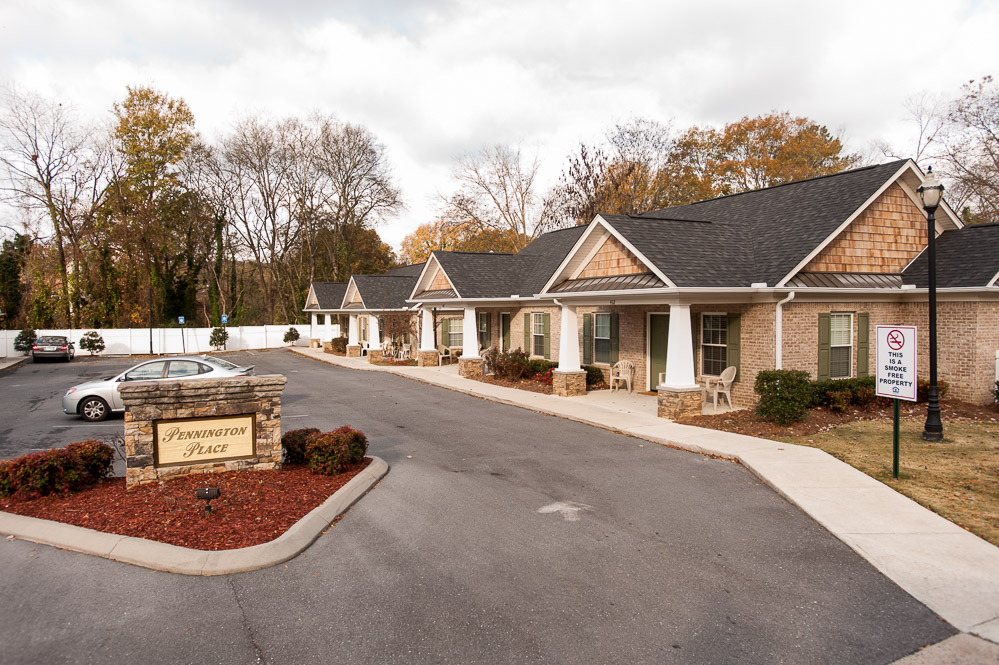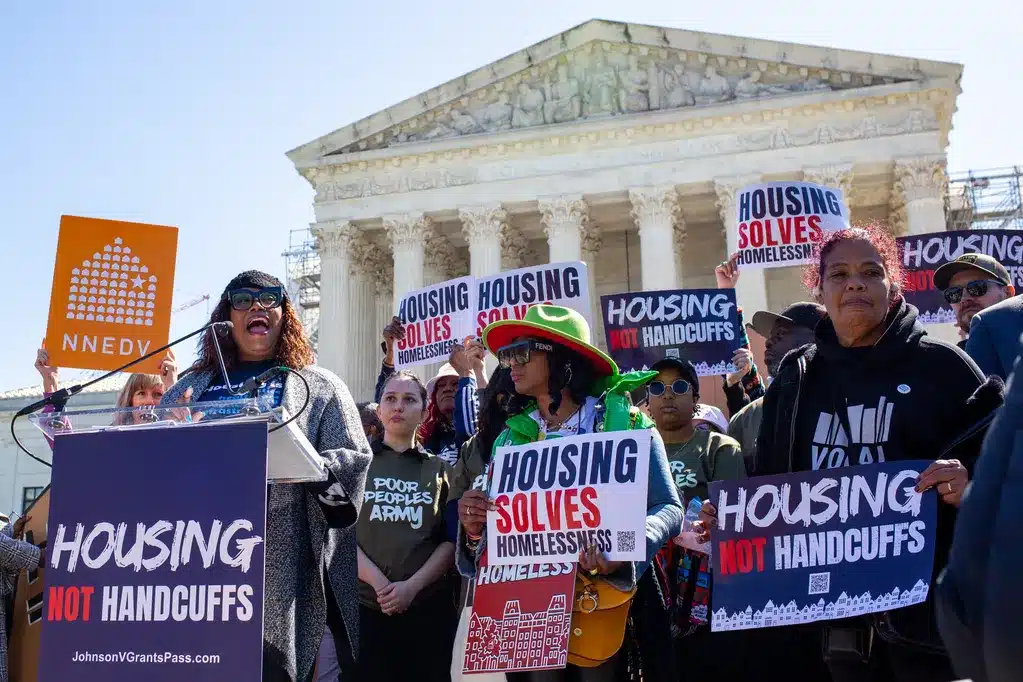“When you come to Rome, you’ll see that we don’t build like everybody else builds,” says Sandra Hudson, a native of Rome and executive director of the Northwest Georgia Housing Authority. NWGHA covers Rome, a town in the Appalachian foothills, and the nearby town of Rockmart.
Employing a mix of HUD grants and initiatives, tax breaks, outside grants from community stakeholders, and high-quality construction practices, Hudson, an industry veteran of three decades, has crafted a creative approach to public housing that puts residents first. While “constantly thinking out the box,” she prioritizes quality over quantity, often using a variety of funding sources to produce or renovate fewer units with better building materials at a higher cost per unit. Hudson is recognized throughout Georgia as a relentless advocate for resident empowerment who transformed the city’s distressed public housing stock into arguably the highest quality public housing in the region.
Starting Out

A legendary figure in the housing space who has mentored numerous housing authority leaders throughout the South, Hudson has always taken pride in serving her community. In 1992, after volunteering with the Rome Housing Authority on drug awareness during the crack epidemic, she became a coordinator for the HUD Public Housing Drug Elimination Program. In that position, Hudson helped start a “Granny House”—a multi-bedroom house used to care for children while their mothers receive drug treatment—in Graham Homes, a troubled complex with a citywide reputation for drug dealing and prostitution. In 1997, Hudson became director of housing and, in 2003, assumed the executive director position she still holds, after a short period as interim executive director. During her tenure, she has served on the boards and volunteered for several nonprofit outreach organizations that work toward community wellness and the effective reintegration of former inmates back into society.
With NWGHA, Hudson has introduced and developed a roster of programs that foster resident empowerment, education, and self-sufficiency. Project SOAR, an initiative originally funded by HUD but now by NWGHA, expands educational opportunities for youth living in HUD-assisted housing. The HOPE reentry program serves individuals released from prison. NWGHA has active partnerships with Montessori-based schools, Rockmart Children’s Academy, and Rome Children’s Academy, the latter located within Graham Homes. Numerous programs promote adult education, drug awareness, health and wellness, and quality of life for seniors.
Because of Hudson’s tenacious pursuit of funding and gift for forming effective partnerships, NWGHA has received many grants and awards, among them a HUD Choice Neighborhoods grant, a HUD Moving to Work designation for high-performing public housing authorities (PHAs), a Governor’s Office Improving Neighborhood Outcomes in Disproportionately Impacted Communities grant, and a Department of Labor YouthBuild grant.
“Sandra is one of the most driven women that I know,” says Allison Morris Cox, executive director of the housing authority in Jackson, Mississippi. Cox investigated child abuse in Graham Homes for the Department of Human Services before being recruited by Hudson to NWGHA in the mid-’90s. “I love her like a second mother. But anybody who’s ever worked for her will tell you it’s not easy because she expects you to work like she works,” Cox says, laughing. “But that’s not a bad thing because she is highly motivated to help others.”
Working with law enforcement
In 1992, after graduating from Spelman with a degree in human resources, Hudson began volunteering for the Rome Housing Authority to promote a drug-free community. “I was down there trying to stop some of the violence and get some of those boys off the street and into a job,” she says, and “since I was down there anyway, they gave me the job as drug elimination coordinator.” Five years later, Hudson was promoted to director of housing, and she remembers the lack of structure and resources plaguing the position. “We didn’t have Section 8, we didn’t have FSS [Family Self Sufficiency], we had no program. So I did a lot of reading and I applied for every grant or opportunity that came my way,” says Hudson. She also launched a community policing initiative.

In the early 2000s, upon ascending to full leadership, Hudson was concerned with police officers “not caring” about their housing authority duties, so she decided they should “work for the housing authority, that way, we are going to tell them what we want them to do.” She negotiated with the city to restructure the way public housing was patrolled by having select officers split time between the city and the housing authorities. Hudson then hired a drug task force veteran of 20 years to supervise the other officers, and that became an effective community policing model for her housing communities in Rome.
“She wanted to have more of a direct involvement with the officers,” says Melvin Scott, Hudson’s housing security consultant and a former police officer in Rome. Over the past two decades, Scott has also served as security director and director of housing. “She wanted the officers to have a sense of buy-in and ownership for the properties as well, and wanted to be able to select those officers who would buy into the mission of the housing authority.”
Hudson also confronted residents who were working against such security measures.
“When I met her, I was being a knucklehead doing what I do over in the projects in East Rome during the crack era,” says Kevin Harper, 54, a former dealer who first encountered Hudson in 1992. Now an owner of numerous Section 8 properties around the city, Harper remembers how “one day, we were doing something illegal, dealing drugs and stuff and she saw it and spoke out, like, ‘I know y’all ain’t going to do that in front of me,’ and how we were ‘disrespecting’ her and the community.” Over time, after years spent in and out of prison, Harper’s relationship with Hudson grew as he turned from illegal activities to investing in housing and his children’s future. “She always told me that she was proud of me for putting my past behind me,” says Harper.
Harper and many residents were resistant to the increased security presence and unit inspections Hudson implemented, he says, “but she spread the concept of an apartment and got us away from that old throwback language of a project or hood, and then remodeled everything.” The residents “didn’t like it at the time or the way she came in there trying to change everything up. But as I got older, and now that I have kids, you want what’s best, you know?” he says. “So I have much love for her.”
a better approach to rad
Hudson wanted to secure the tools to upgrade the city’s housing stock as well, a key tool being HUD’s Rental Assistance Demonstration program (RAD), which encourages the recapitalization of public housing assets by taking them out of the formal public housing program. The federal program addresses the multi-billion-dollar nationwide backlog of deferred maintenance in public housing by enabling PHAs to bring in other sources of funding and convert from public housing subsidies to project-based Section 8 subsidies. There has been significant criticism of the RAD program, especially when PHAs partner with developers and use low income housing tax credits (LIHTCs).
“In 2014, most of the housing authorities that partnered with developers in terms of utilizing low income housing tax credits had a relationship where the developer did all of the work and would then own all of the units that were converted using these credits,” says Paul Robinson, co-owner of Sepia Transformation Partners, a community-minded affordable housing development company. That same year, through a former employer, Robinson worked with Hudson on the redevelopment of Willingham Village, which Robinson says was one of the first RAD deals using LIHTCs in Georgia. “The usual split on developer fees was in the range of 90 percent going to the developer, with 10 percent going to the housing authority, and sometimes 80-20. But when RAD came about, it offered housing authorities an opportunity to look at their assets a little bit differently,” he says, noting Hudson spearheaded a different RAD-based model by working with conscientious developers willing to negotiate more equitable profit splits. “They looked at it from the standpoint of how do we, as a smaller and rural housing authority, stay in business if we’re giving all our assets to the private developer?” says Robinson. “So the negotiations started with the housing authority bringing certain aspects to the table that the developer couldn’t”—land, project-based rental assistance, a connection with community stakeholders, PILOTs (federal payments to offset losses in property taxes)—while “the developer brought the financing tools and the experience with state agencies and other financing organizations that allowed them to put up the financial guarantees.”
This approach resulted in both parties being more evenly matched, regarding assets, capacity, and finances. “A lot of developers couldn’t get with this at the time, but there were some developers like ourselves that basically said, not only we will participate, but we will help build the capacity of the housing authority,” explains Robinson, clarifying that upon stabilization—or three months after construction is completed—developers like him can leave the deal. “So the housing authority is a co-general partner and a co-developer and, therefore, it’s just a matter of us, the for-profit co-developer, to exit the partnership as they just basically have to meet the requirements for being able to handle tax credit compliance and property management.”
“Some people thought RAD was bad because of their relationship with their developer, but NWGHA has been able to create a situation where they use the developer through the construction, financing, and stabilization of the property, and then retain ownership,” says Robinson. “Because RAD is such a large program, a turnkey developer can do volume as opposed to spending a lot of time creating a management company to run the management side” given that “we will eventually be taken off the guarantee and can move on to another development.” Developers operating on this business model make money from the cash flow from the deal while in it, and then collect the developer fees they’ve earned upon exit. As with any LIHTC deal, there are still investors who will remain limited partners for 15 years, as well, but as general partner, the housing authority is “in charge, just like it was before, in terms of doing the property management and having the capacity to further invest in residents, communities, and self-sufficiency programs at the site.”
Other PHAs in Georgia, like the city of La Grange’s, have effectively followed Hudson’s lead in terms of using RAD while prioritizing residents and retaining ownership along with the capacity to reinvest in themselves, Robinson says. But for all her innovations and accomplishments in the field of housing, Hudson expresses her agenda in simple terms: “If I would not want to live in a unit, then I will not rent the unit to our residents.”
Hudson looks beyond renting, too. Home ownership represents self-sufficiency, the ultimate goal she wants her residents to achieve. “When I first started in housing, I found out that in Alabama, they had a housing counseling agency,” she says. “I went and took the training and then we applied for the money, so now we are HUD-approved, under one of our nonprofits, as a housing counseling agency.” Along with being a LIHTC developer and a property management company, NWGHA provides well-attended counseling sessions on home buying, mortgage default, and other aspects of home ownership.
What’s next for hudson?
Hudson’s retirement was announced in October, and some wonder what will happen when she steps down.
“It’s going to be very difficult to replace her and I don’t think we ever will because she is not replaceable,” says Lee Hight, chair of the NWGHA board. Hight marvels at how Hudson can “probably tell you about every resident in the housing authority,” and is accessible to residents, regardless of the hour. “She answers every call she gets, she publishes her cell number, and they call her. And when they call her, especially the younger people, she treats them as if they are her own.”
Hudson’s legacy is her belief in the value of her residents and their dreams.
“She gave dreams to people that they could ultimately attain homeownership and, even if they couldn’t financially build a house right now, she still made their housing a home,” says Elaina Beeman, education navigator for NWGHA and Hudson’s friend of 40 years. “She gave them the opportunity to have what everybody else has in their homes and it didn’t matter what kind of pocketbook or paycheck they had.”
Beeman sums up Hudson’s unparalleled 30-year journey in housing: “Her legacy is that she made the impossible possible.”






Comments